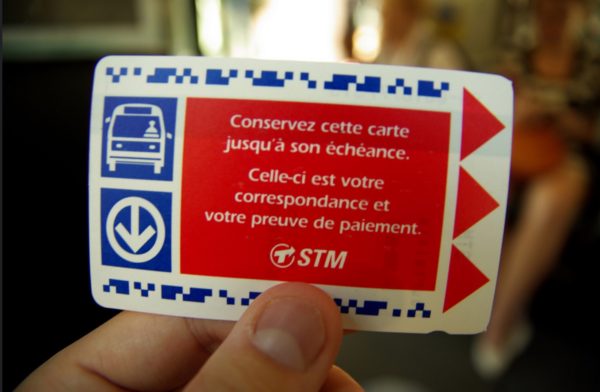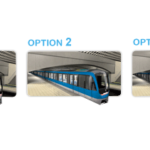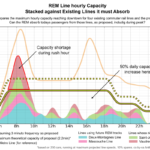STM By-Law on Tickets Found Unconstitutional:the Judgment Explained
Tuesday, September 20th, 2016The following article is written by JC, a non-practising lawyer who sometimes collaborates with Ant6n on his blog posts, and is not a legal opinion.

Make sure you hold onto that ticket. Image by Cedric Same. source.
On September 7, 2016, a Municipal Court judge rendered a judgment that declared unconstitutional sections 6 and 9 of the STM by-law that allowed STM inspectors to fine transit users who could not provide proof of payment.
The judgment is quite thorough (and quite long, 55 pages), and I encourage you to read it if you can. The issues are pretty complex. This post is a simplified summary that, I hope, will provide an understanding of this specific case, and constitutional principles in general.
Content:
- The Defendants
- Constitutionality
- Question 1: Presumption of innocence
- Question 2: Arbitrary detention
- Question 3: the section 1 test
- Conclusions
The defendants
A quick word on the 3 defendants:
- Defendant 1 and his wife, both living in Chambly, bought individual tickets. After entering the metro system, they threw their tickets away and were subsequently fined for not being able to provide their tickets.
- Defendant 2 was traveling with 2 others who both had monthly passes. He bought a six-pack of tickets, used one to enter the metro system and threw it away.
- Defendant 3 had a monthly pass, but forgot it that day. She therefore bought a single ticket, then threw it away. She was traveling with a large suitcase that contained work equipment.
All of the incidents happened in 2009, about 1 year after the STM introduced the new ticketing/Opus card system.
For the evaluation of constitutionality, the important facts are that all Defendants had all paid the fare, and they had all been stopped and fined by STM inspectors.
Constitutionality
The defendants contested their tickets on the basis that sections 6 and 9 of the Règlement R-105 (the “STM by-lawâ€) were unconstitutional.
They claim that:
- section 6 (the obligation to pay the fare and keep your ticket) violates the presumption of innocence
- section 9 (showing proof of payment to inspectors) violates the protection against arbitrary detention.
Constitutionality is evaluated with a 2-step process:
- Is there a violation of a Charter right?
- IF there is a violation, is it justified in a free and democratic society? (this is commonly known as the “section 1 testâ€)
In this case, the judge had to answer 3 questions:
- Do sections 6 and 9 of the STM by-law violate the presumption of innocence?
- Does section 9 of the STM by-law violate protection against arbitrary detention?
- If yes at 1 and 2, is the violation justified in a free and democratic society?
Question 1: Presumption of innocence
The principle of presumption of innocence is guaranteed by section 11. d) of the Canadian Charter of Rights and Freedoms . It applies in criminal matters as well as for statutory infractions (see par. 64-71 for full discussion.)
The Charter simply states that “any person charged with an offence has the right to be presumed innocent until proven guiltyâ€. In practice, this means that it is up to the prosecutor (the “Stateâ€) to prove the guilt of the accused, and a reversal of the burden of proof, where the accused must prove his innocence, may be considered a violation of the presumption of innocence.
The infraction and the burden of proof
Section 6 reads as follows:
6. Anyone using the transportation services offered by or on behalf of the Société, shall, according to the applicable fare and in the manner prescribed, pay the cost of his fare or use a transit fare recognized as valid by the Société. Once he has paid his fare, the person shall retrieve and retain the fare media as evidence of payment for purposes of section 9.
After considering the history of the legislation, the Court concluded that here was a reversal in the burden of proof in 2008:
- Before 2008, the by-laws explicitly stated that any user who went through the turnstiles was presumed to have paid the fare
- After 2008, the STM by-law put the onus on the user to prove that he paid the fare by showing proof of payment
The STM’s claim that not having proof of payment is an infraction by itself under section 6 was dismissed by the Court based on the wording of the by-law and the fact that the fine for users who didn’t keep their tickets and those who actually did not pay was exactly the same (par. 55-60.)
Does section 6 violate presumption of innocence?
The wording of the second sentence of section 6 (“shall retrieve and retain†/ â€doit récupérer et conserverâ€) makes the ticket the only acceptable way to prove payment. Any other proof via testimony or circumstantial evidence would be inadmissible.
Had the STM accused the Defendants of traveling without paying the fare (an infraction under section 57), Defendants would actually have been able to defend themselves via testimony or circumstantial evidence.
And that’s where the problem lies.
The judge points out that the system under section 6 is even more strict than “absolute liabilityâ€. Under “absolute liabilityâ€, proof of the actus reus (the act prohibited by the law) automatically leads to a declaration of guilt, even if the accused was in good faith.
According to the judge, under section 6, the STM does not even need to prove the actus reus (the non-payment of fares, in our case) AND, on top of that, Defendants have no way of proving that they have paid.
[77]      Il faut donc voir plus loin que la surface du nouveau règlement. Le véritable effet des articles 6 et 9 est de mettre sur les épaules des gens interpellés le fardeau de prouver leur innocence — sur le champ. S’ils ne peuvent pas le faire sur le champ et de la manière exigée par la STM, l’affaire est réglée : ils devront payer la même amende et les frais que s’ils avaient sauté les tourniquets. La STM n’aura jamais à prouver qu’ils n’ont pas payé. En termes d’efficacité de poursuite, la STM pourrait difficilement imaginer mieux.
The principle of presumption of innocence requires that :
- Guilt be established beyond reasonable doubt.
- The State must present its proof before the accused needs to respond.
- Criminal proceedings be carried out in accordance with lawful procedures and fairness.
Sections 6 and 9 of the STM by-law violates all 3 principles because:
- They allow a declaration of guilt when there is reasonable doubt, and (worse) even when a judge is convinced of the innocence of the accused.
- They force the defendant to present its proof before the prosecution, and before they actually get to court.
- The proceedings are against the rules of lawful procedures and fairness as they disallow proving innocence by other normally accepted means (testimony and circumstantial evidence).
For these reasons, the Court concludes that section 6 and 9 of the STM by-laws violate section 11 of the Charter.
Question 2: Arbitrary detention
Arbitrary detention means just that:
- there was detention
- it was arbitrary
Detention
When an STM employee stops a user inside a “control areaâ€, does it constitute “detentionâ€?
The Supreme Court of Canada has already ruled that detention may be “psychologicalâ€, when a person has a legal obligation to comply. This is the case here, as section 9 clearly states:
Subject to section 11, a person shall, at all times, when travelling on a bus or a metro car or when inside the control area of a station, provide evidence that he has duly paid his fare in compliance with this By-law.
He shall, upon request, allow an agent to check if he has paid the cost of his fare in compliance with the fares and regulations in force and if he has valid transit fare and fare media.
The Court therefore concludes that the Defendants have been detained.
Arbitrary
The STM claimed that since its inspectors are authorised by law to check tickets, users are not detained arbitrarily.
The judge points out that the Supreme Court has many times over declared that a detention, even when authorised by law, is arbitrary when there are no selection criteria or procedure, and the selection is entirely left to the agents.
In this case, the stops were entirely random and left at the absolute discretion of the agents (“complètement aléatoires et constituaient l’exercice d’un pouvoir discrétionnaire absoluâ€).
The STM claimed that users in the STM system voluntarily entered a regulated area (“une zone d’activité réglementéeâ€) and must submit to the rules in force.
The judge’s response, which I will copy in full, really puts forward the basic principles at the root of our democratic institutions:
[111]   Cette comparaison à une activité réglementée est boiteuse, parce que contrairement à la personne qui choisit de s’engager dans une activité industrielle ou commerciale, l’usager du transport en commun ne tire aucun profit monétaire de son activité. Et contrairement à la chasse ou la pêche, le déplacement en métro ou en autobus de la STM n’est pas une activité de loisir. La réalité du transport en commun est qu’il s’agit d’un service public essentiel qui appartient à tous et dont l’utilisation est un droit. Le paiement du tarif n’est qu’une façon de financer le service et de répartir ce financement équitablement entre les usagers en fonction de leur utilisation. Mais l’utilisation de ce service reste un droit et le quai du métro reste un espace public qui appartient à tous.
[112]   Il ne faut pas comparer le quai du métro à une propriété privée que le propriétaire peut gérer à sa guise. Il ne faut pas non plus le comparer à un immeuble à bureaux de la fonction publique où l’accès peut de façon légitime être limité aux fonctionnaires qui y travaillent.
[113]   Moyennant le paiement du droit au moment de son entrée, et dans la mesure qu’il respecte les règles de sécurité et ne dérange pas les autres, l’usager du métro a le droit d’être sur le quai et à tout endroit appelé « zone de contrôle » sans craindre d’être « contrôlé » ou appelé à justifier sa présence. L’usager du métro ou d’un autobus a les mêmes droits que toute personne sur un espace public et cela comprend le droit de ne pas être interpellé sans raison par un agent de l’État, en uniforme ou non, qui exige qu’il produise des papiers. Ce genre de contrôle par un agent de l’État est contraire à nos traditions de liberté publique et évoque des mauvais souvenirs d’autres pays au siècle dernier. Il ne doit pas être toléré lorsqu’il existe d’autres moyens, moins répugnants, pour atteindre le même objectif.
The Court concludes that there was indeed arbitrary detention.
Question 3: the section 1 test
Given that section 6 and 9 violate rights protected by the Charter, the STM must prove that they are reasonable and justifiable in a free and democratic society in order to avoid having them declared unconstitutional. This requirement stems from the wording of section 1 of the Charter.
The actual test is broken down like this:
- A sufficiently important objective, related to concerns which are pressing and substantial
- The means chosen are reasonable and demonstrably justified
- The measures must be carefully designed to achieve the objective
- They should impair “as little as possible” the right or freedom
- There must be a proportionality between the effects and the objective
1. A sufficiently important objective
The STM claimed that the measures are put in place in order to reduce fraud, although no evidence was submitted showing a reduction of fraud after the implementation of the new system.
The STM did, however, submit voluminous evidence (“une preuve volumineuseâ€) on the amounts lost every year through fraud.
The STM reports and testimonies are detailed in par. 127-170 of the judgment, which is well worth a read and could be the object of its own blog post. Overall, the judge concludes that the STM fraud studies were methodologically flawed and mostly showed fraud committed by its own employees:
[169]   Au delà des problèmes de méthodologie, il y a, selon le Tribunal, un sérieux problème avec l’utilisation par la STM des ces deux rapports dans le cadre de la présente requête. C’est le fait que les deux études ont estimé le manque à gagner causé non pas par les usagers, mais par les employés de la STM qui ne font pas leur travail! La première étude a estimé ce qui arrive quand les chauffeurs d’autobus ne font pas leur travail de perception. La deuxième étude a estimé ce qui arrive quand les changeurs du métro ne font pas leur travail. Et au lieu de sévir contre les chauffeurs et changeurs qui ne font pas leur travail, la STM utilise ces données pour blâmer les usagers et justifier des méthodes plus répressives contre eux.
[170]    Par conséquent, la « fraude » invoquée par la STM pour justifier les articles 6 et 9 de son Règlement est essentiellement une perte d’argent causée par l’incurie de ses propres employés — quand ce n’est pas carrément des vols commis par ses employés!
The Court considered that the STM has not proved that fraud was a sufficiently important objective to justify suppressing Charter rights.
A failure on this first criterion is sufficient to declare the sections (6 and 9) unconstitutional.
2. The means chosen are reasonable and demonstrably justified
The Court actually analyses the second criterion, since both parties presented thorough arguments in court. We will not summarize this part, as both sections have already been determined to be unconstitutional and cannot be “saved†by the second part of the test.
Conclusions
Overall, the Court found that both section 6 and 9 of the STM by-law were unconstitutional.
Section 6 violates the presumption of innocence because it reverses the burden of proof and creates a situation where an accused could be found guilty even when a judge was convinced of his/her innocence.
Section 9 violates the right to be protected from arbitrary detention, because it allows STM inspectors to stop any user at will, without requiring any suspicion of wrongdoing.
A violation of charter rights does not automatically mean it is unconstitutional. A law that violates charter rights can still be constitutional if it is justifiable in a free and democratic society. In fact, many of the precedents presented by the STM were cases where the violations were justified (they passed the “section 1 test).
In this case the Court was not convinced, from the evidence presented by the STM, that fraud was a sufficiently important objective to justify the rights violations.
Therefore, section 6 and 9 of the STM by-law are found unconstitutional.
Comments
This judgment probably doesn’t change much just yet, as the STM can still file for an appeal, which it intends to.
We will have to wait and see how the appeal goes. If the unconstitutionality is maintained on appeal, we can probably expect the STM to modify its by-laws to bring them in line with the constitution.


